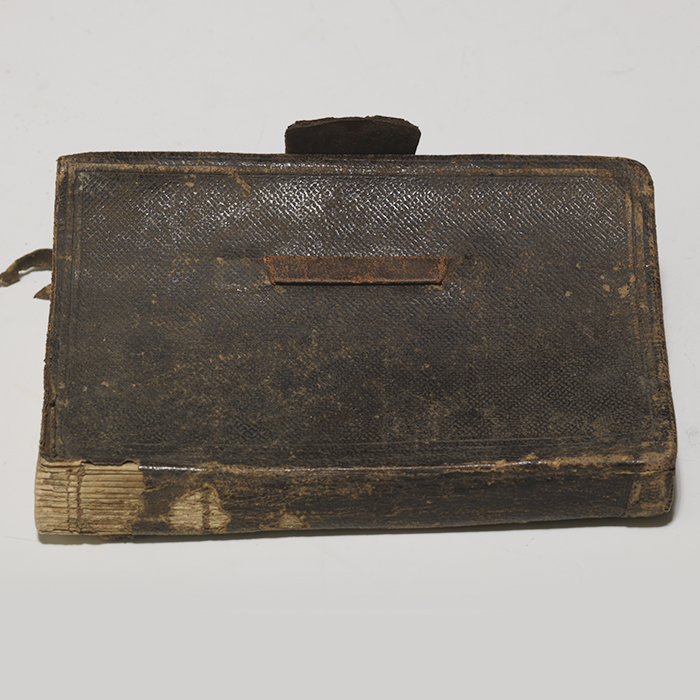
“ALL DAY HEAVY FIGHTING AND A GREAT MANY BOTH KILLED AND WOUNDED”: RARE 1862-63 CIVIL WAR DIARY BY SERGEANT WICKS OF THE 25TH NEW JERSEY VOLUNTEERS, INVOLVED IN THE BATTLE OF FREDERICKSBURG AND THE SIEGE OF SUFFOLK
(CIVIL WAR) WICKS, H.H.G. Civil War Diary. No place: no publisher, [1862]. Small octavo (measures 3-3/4 by 5-3/4 inches), original full black morocco, wallet-flap portfolio closure. Housed in a custom chemise and clamshell box. $4000.
Rare October 1862-May 1863 Civil War diary by Sergeant H.H.G. Wicks of Company B of the 25th New Jersey Volunteers, who was involved in front-line action during the important Battle of Fredericksburg, December 11-15—a significant Union defeat—and the April-May lifting of the Confederate siege of Suffolk, Virginia.
Wicks' diary begins October 20, 1862, in Washington DC, where Wicks mentions visiting the Smithsonian. Shortly after his regiment marched to Fairfax Cemetery, where they made camp. By November 20 the order comes to "be ready at a moment's notice." His diary faithfully records typical daily activities and soldierly concerns: the weather, drills, reviews, inspection, dress parade, picket duty, illnesses, marches, striking and pitching tents, and chances to wash, eat, receive letters from his wife, and enjoy liberties. By December 2 the regiment began marching south, and Wicks switched to recording his diary in pencil.
They arrived near Fredericksburg by December 10: "This night the pontoon bridges was laid across the Rappahanock." Then on the next day, "At 6 o'clock this morning the fighting commenced at Fredericksburg… We are now General Sumner's Division… Hour folks has bin a shelling the town all day." December 11 he can hear the artillery, and then December 12 he and his regiment are called into front-line duty: "This morning had orders to fall in and we all lade on hour harms [our arms]. All day heavy fighting all day a great many boath killed and wounded. At dark orders were given to march into the battle field and we got in about 7 o'clock and there was several of hour rigament boath killed and wounded and then fell back into the sitty and lade on hour arms for the night." The next day he writes "Mostly quiet today not mutch firing from eather side the Rebels throwing up entrenchments all the time. Seven wounded out of hour company in the fight last night… yet there is now about two hundred thousand troops here now… in a line of battle all day put gards… for the first time for four days and nights I had a good night rest." The next day he returned from picket duty to find "all hour troops left the town and we started for hour old camp and got lost in the woods and four of us fell out of hour company together." He and his fellows caught up to his regiment the next day, noting, "the rebels all back in the City again this morning every thing quiet… no fighting again on there this day hour men started over with a flag of trus [truce] to bury hour dead." The Battle of Fredericksburg was fought December 11-15, 1862, between General Robert E. Lee's Confederate Army of Northern Virginia and the Union Army of the Potomac, commanded by Major General Ambrose Burnside, who ordered Major Generals Edwin Sumner and Joseph Hooker to make multiple frontal assaults against General Longstreet's position on Marye's Heights, and the Union forces were driven back after suffering heavy losses.
On December 19 Wicks writes, "Everything all quiet about Fredericksburg and it is so said that McClellan has got back to the Army again." The fighting had ceased, but the regiment remained near the Rappahanock, and on Christmas he writes, "Had for my Christmas dinner beef soup… can see the rebels camp from where we are." Wicks fell ill in January, and heavy weather seemed to keep them in camp until February 7, when they relocated to Newport News. On March 8 he notes, "This day assigned the duties of orderly." He then writes of the lifting of the Confederate siege of Suffolk, presumably at a later date, "The Rebs commenced the attack on Suffolk the 11 day of April 1863… on the 18th capt 129 rebs and a battery 5 guns." He then goes on, "In the battle in front of Suffolk Monday May the 3 1863 started from camp at 7 o'clock in the morning and went down to Suffolk and crossed the [Nansemond] River and throughout as skirmishers with the 103 N York and 89 N York in hour Regament there were one killed and 11 wounded. The chaplain was wounded so that he died next day. Sergt Skinner was shot through the head and killed instantly we drove the enemy and returned two hour camp at 12 o'clock at night. The reconnaissance was continued the next day by Corcoran's Legions and drove them out to the black water." The Siege of Suffolk lasted from April 11 to May 4, 1863. Wicks' final entry is dated May 11, 1863. Portions are written in faint pencil, though still legible; the last several leaves are in a heavier script showing some smudging, though also still legible. With six pages of company rolls recorded in the back of the book, as well as a few sums and other lists.
From the Denis E. Reen collection, with his bookmark laid in.
Expected wear to binding, particularly at wallet flap and spine head, some inkstaining to text. A very good Civil War diary by a soldier who participated in the Battle of Fredericksburg.